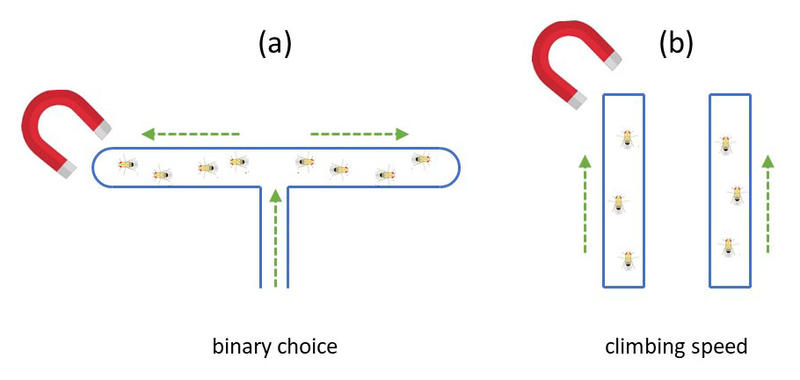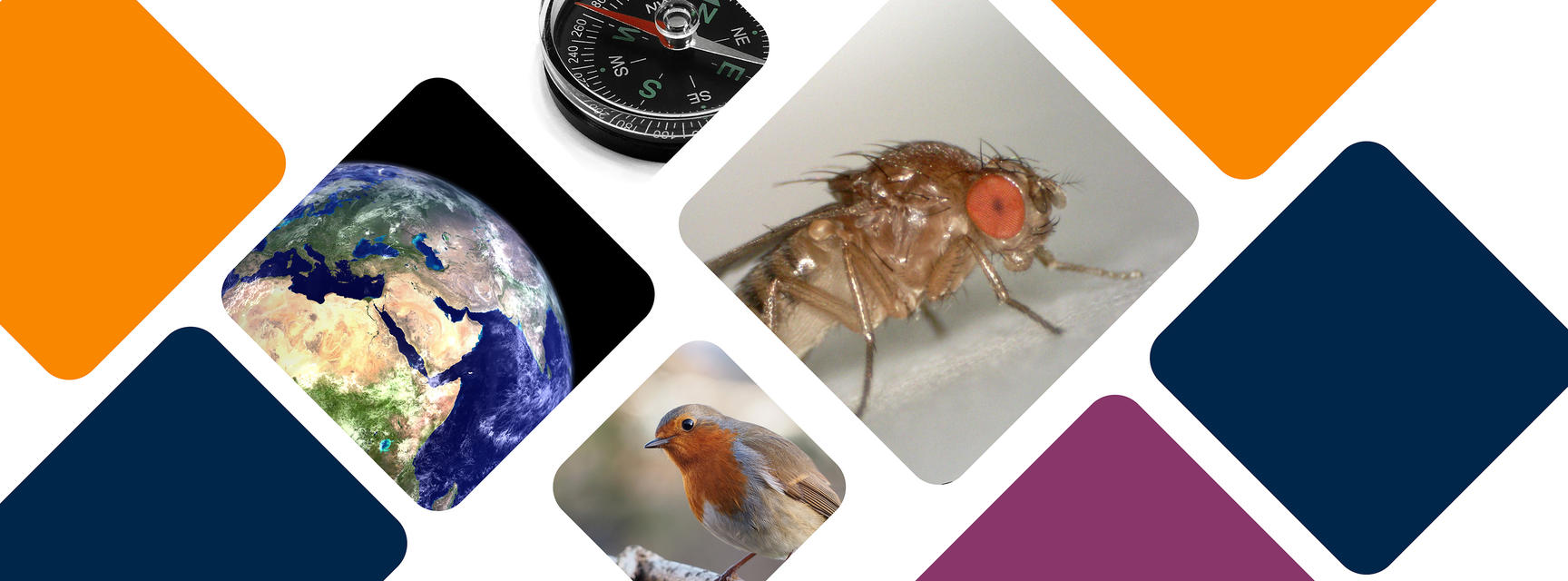No evidence for magnetic field effects on fly behaviour
- A team including Oxford chemists has shown that influential reports of magnetic field effects on Drosophila (fruit fly) behaviour cannot be reproduced.
- Drosophila have been widely used as a model organism for studying the mechanism of the magnetic compass sense of migratory songbirds.
- This meticulous new study, published today in the journal Nature, casts considerable doubt on the existence of magnetic sensing in flies.
Migratory songbirds, such as the European robin, use the Earth’s magnetic field as a source of directional information. The exact mechanism behind this compass sense is not fully understood, but the most promising hypothesis focuses on cryptochrome proteins in the birds’ eyes. Drosophila (the common fruit fly) is a species long favoured in genetic research, and has been used as a model organism in many behavioural studies that report cryptochrome-mediated magnetic field effects.
A team made up of researchers from the Universities of Oxford, Oldenburg, Trento, and Exeter has completed a series of highly controlled experiments aimed at replicating two previous studies that reported magnetic field effects on the behaviour of fruit flies, and were unable to find any evidence of magnetically sensitive behaviour in Drosophila.
Their studies used many more samples than previous studies, testing over 100,000 flies over a period of six years. They have also reassessed the statistical approaches and sample sizes in the studies they were trying to replicate and have suggested that many, if not all, of the original results are false positives.

Figure 1: Cartoon representations of the two main experiments in the study: (a) a T-maze to test whether flies show a preference/aversion for the arm with an applied magnetic field, and (b) an experiment observing how quickly flies climb up the inside of a tube with and without an applied magnetic field. In both sets of experiments the team were not able to observe the magnetic field effects that previous studies had reported.
The first of their two main experiments involved placing flies in a T-shaped maze, with a magnetic field about ten times stronger than the Earth’s applied to one of the arms (Figure 1a). Previous studies had reported that flies would avoid the magnetic arm, unless they had been trained to associate a magnetic field with a sugar reward, in which case they would prefer the magnetic arm. In the new study over 90,000 flies were tested, and the researchers found no preference for, or avoidance of, the magnetic field in either the naïve or trained flies.
The second experiment did not require flies to be trained but focused on a spontaneous behaviour: climbing up walls. Known as negative geotaxis, this is an innate escape response (Figure 1b). A previous study had found that, when knocked to the bottom of a plastic tube, flies that were exposed to a magnetic field were slower to climb the tube than those with no field applied. In the new study the researchers tested over 10,000 flies under the same conditions as the original experiment, and also using improved equipment designs, but could find no difference with and without a magnetic field.


Figure 2: The electromagnetically shielded laboratory at the University of Oldenburg where most of the experiments were carried out.
The team had a number of measures in place to ensure they were getting robust results. They conducted their experiments in a completely non-magnetic custom-built research facility in Oldenburg (Figure 2), which allowed them to meticulously exclude all external electromagnetic fields that might have influenced the experiment. The experimenters were also blind to the magnetic conditions at the time the measurements were performed, and used a much larger number of flies than any previous study – over 100,000 in total.
Dr Marco Bassetto, a DPhil graduate from the Oxford Chemistry Department and one of the lead authors of the study, says:
Working with songbirds is challenging: they cannot routinely be bred in captivity and many modern genetic approaches are inapplicable. A broadly reproducible behavioural paradigm to test for magnetoreception in a model organism would greatly facilitate the search for the exact mechanisms, sensory molecules, genetic basis and neuronal responses. Our findings cast considerable doubt on the existence of magnetic sensing in Drosophila and strongly suggest that night-migratory songbirds must remain the organism of choice for future studies of this extraordinary sense.
You can read more about the study in the Nature article here, and hear Peter discuss the study in the Nature podcast here.
Images: Hannah Davis, Francis C. Franklin, Evan-Amos, Kevin Gill, all Wikimedia Commons; Henrik Mouritsen, Peter Hore.





